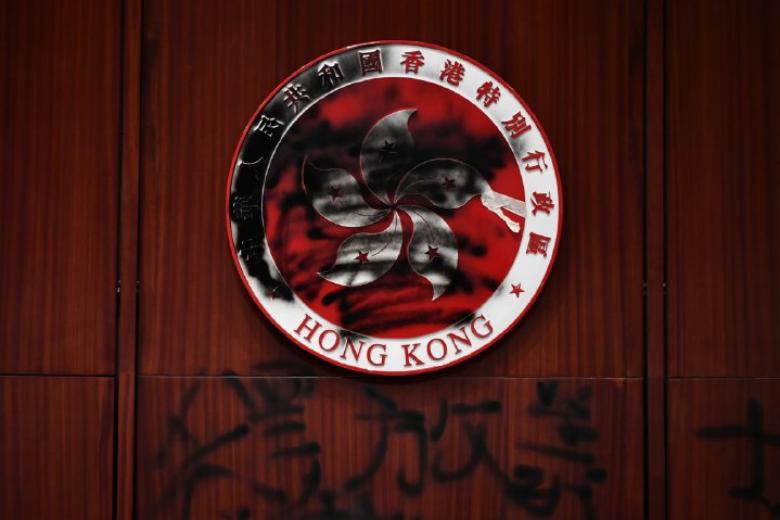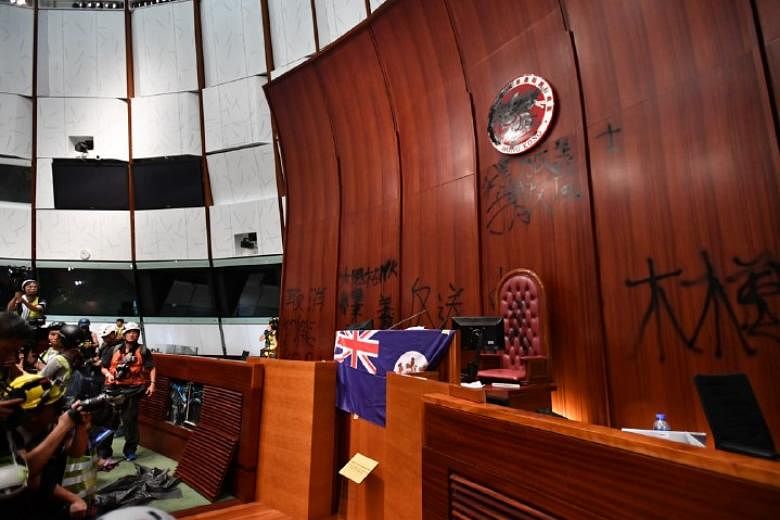For China, a growing conundrum: What to do with Hong Kong?
Sign up now: Get insights on Asia's fast-moving developments

Protesters who stormed the Hong Kong legislative building on July 1 selectively defaced signs of Beijing's sovereignty.
ST PHOTO: LIM YAOHUI
HONG KONG (WASHINGTON POST) - In Hong Kong, the semi-autonomous Chinese territory, protesters stormed the legislative building on Monday (July 1), selectively defacing any signs of Beijing's sovereignty after weeks of massive demonstrations against a controversial extradition Bill.
In mainland China, meanwhile, dissent is silenced, news heavily censored and criticism of the government punished.
The staggering difference represents a growing problem for Beijing: how long can and should Hong Kong be allowed to remain so defiant before it becomes ungovernable by Beijing's strict standards?
Monday's protest, planned for the anniversary of Hong Kong's July 1, 1997, handover from British colonial rule to Hong Kong, was dripping with symbolism.
Demonstrators removed the Chinese flag from a flagpole, and replaced it with a black one featuring a withered, black Bauhinia, the flower on Hong Kong's emblem.
Inside the legislative building, protesters spray-painted over any references to the "People's Republic of China".
Perhaps most stark of all, they draped Hong Kong's British colonial flag in the chamber, 22 years after it stopped flying here.
"It is a major, big symbolic meaning that Beijing does not like, and they will be unhappy that the Hong Kong government and (Chief Executive) Carrie Lam did not control the situation," said Hung Ho-Fung, an expert in Chinese political economy and Hong Kong politics at Johns Hopkins University.
In an interview before Monday's escalation, Ronny Tong, a member of Hong Kong's Cabinet and a legal adviser to Lam, gave an even sterner warning.
"When there is trouble in Hong Kong, when things turn sour and there is violence in the streets, our fear is that if the police is unable to control what is happening here, there's a remote risk that the (Chinese army) would get involved," Tong said.
"It would spell the end of 'one country, two systems.'"
Chinese state media and officials took a hard line against the protests, which have ballooned into calls for more autonomy and democratic guarantees for Hong Kong.
Nationalistic tabloid Global Times newspaper said protesters acted "out of blind arrogance and rage" and "showed a complete disregard for law and order".

Inside the Hong Kong legislative chamber, protestors put up a British colonial flag during the July 1 protests.
In a statement on Tuesday, China's liaison office for Hong Kong and Macau condemned the storming of the legislature as the work of "extreme radicals" and expressed support for "criminal sanctions to the violent offenders".
"It is kind of an instruction," said Jean-Pierre Cabestan, a professor at Hong Kong Baptist University, about the statement.
Lam, Hong Kong's leader, "has been instructed to be harsh".
The unprecedented intensity of Monday's protests will also give Beijing "a reason for being much more hands on and more repressive" when it comes to Hong Kong, he added.
Hong Kong was promised a high degree of autonomy when it was handed back to China in 1997, including its own political system, legislature, immigration system and economic framework. The territory has for years been a democratic outlier in the region, and rallies here - particularly one marking the Tiananmen crackdown - have been a yearly family-friendly affair.
But an escalation and a direct challenge to Beijing's rule came during a 79-day occupation of Hong Kong's streets in 2014, which was then the strongest rebuke of China's growing political influence.
In its wake, the authorities followed a familiar playbook: arresting and jailing protest leaders in drawn-out proceedings. Young activists who rose to fame through the protests, known as the Umbrella Revolution, were disqualified when they ran for and won legislative seats.
The idea, analysts say, was to create a chilling effect, quash Hong Kong's civil society and encourage protesters not to do it again - a strategy that largely worked for five years, until recent weeks.
"They had already judged that Hong Kong was ungovernable after the Umbrella Revolution," said Hung. "But then they did this mass arrest, put the leaders behind bars. They expected that Hong Kong civil society would be paralysed."
"They have been very surprised," he added.
Millions of people have taken to the streets of Hong Kong in recent weeks, sparked by a law that would allow extraditions to mainland China. The Bill has now been suspended, but the movement has grown into one expressing a host of deep pent up grievances - most fundamentally that the Hong Kong government is not directly elected or genuinely representative.
Some of the protesters who had spent hours smashing their way into the Hong Kong legislature on Monday spoke of fearing nothing, not even death or arrest.
Experts and observers say the most radical protesters come from underprivileged families, and reflect a potent sense of hopelessness in one of the most unequal cities in the world.
Cabestan argued that Beijing will want Hong Kong's government to start addressing these issues to ease social drivers of the unrest: a mixture of "carrots and sticks".
"Beijing on the one hand will try to convince the Hong Kong authorities to try to give more benefits to the underprivileged," he said.
" On the other hand, Beijing will impose a shorter leash on Hong Kong," he added.
The Hong Kong government, however, remains in a bind.
The city's housing market is the world's most expensive, and any solution would not be immediate.
Meanwhile, mass arrests around Monday's protests like Beijing wants would risk provoking mainstream anger yet again. Around 2 million people showed up at a march last month, shocked at a police crackdown on young protesters who surrounded the legislative buildings a few days before, organisers said.
And then there is the fundamental question of the legitimacy of Hong Kong's government and a demand for universal suffrage - a concession that is virtually unthinkable from Beijing.
"I feel that in the longer run, any kind of unrest in society cannot be resolved without considering some kind of political structure reform, especially for the young people," said Michael Tien, a pro-Beijing lawmaker, in an interview.
There is a "fundamental frustration," he added, that Hong Kong's legislature "is not safeguarding their interests".


